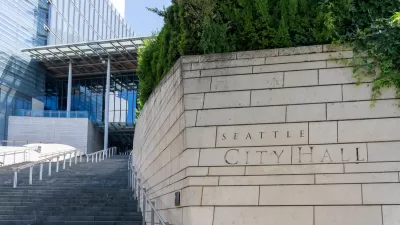The subdivision process imposes rules that result in a lack flexibility, convoluted urban design, and diced up landscapes.

Ray Dubicki argues subdivision and the parceling of land should get as much attention as zoning when examining how cities are shaped. "Once a lot is created through subdivision, it never gets unmade. Subdivision leaves a paper trail burdened with the weight of the past and creating a significant barrier to change. That barrier gets higher and higher as we shred city land into the tiniest possible atoms."
Dubicki says the decisions related to subdivision can create less-than-ideal results that are permanent. "There is a reason that the building industry refers to the results of subdivision approvals as 'entitlements.' They are court enforceable rulings on the intensity of development and limits to what the city is asking for. Builders plug this into their accounting to figure out profit and loss. The jurisdiction’s hands are then tied."
Subdivision also hinders denser developments by creating smaller and smaller parcels that are then more difficult to consolidate for larger multi-family buildings. In addition, parcels such as "flag lots," requiring long, shared driveways for access to a public road, create "puzzle piece subdivisions," says Dubicki.
"Perhaps our challenge is to move our subdivision mindset away from the simple parceling out of land and entitlements. The flat, indelible lines of subdivision are just as inflexible as the old flat LEGO baseplates. We are developing newer ways of thinking about layers of space in our cities, including different methods of ownership and the ways they impact our communities," adds Dubicki.
Update: At the end of his article on subdivision, Dubicki asked readers to nominate the strangest lot lines in the Seattle areas. He has compiled the most bizarre lot winners, including the Olympic Hammerhead, Sammamish Crop Circles, and the Land Meander.
FULL STORY: The Lines We Draw: Subdivision

Maui's Vacation Rental Debate Turns Ugly
Verbal attacks, misinformation campaigns and fistfights plague a high-stakes debate to convert thousands of vacation rentals into long-term housing.

Planetizen Federal Action Tracker
A weekly monitor of how Trump’s orders and actions are impacting planners and planning in America.

In Urban Planning, AI Prompting Could be the New Design Thinking
Creativity has long been key to great urban design. What if we see AI as our new creative partner?

King County Supportive Housing Program Offers Hope for Unhoused Residents
The county is taking a ‘Housing First’ approach that prioritizes getting people into housing, then offering wraparound supportive services.

Researchers Use AI to Get Clearer Picture of US Housing
Analysts are using artificial intelligence to supercharge their research by allowing them to comb through data faster. Though these AI tools can be error prone, they save time and housing researchers are optimistic about the future.

Making Shared Micromobility More Inclusive
Cities and shared mobility system operators can do more to include people with disabilities in planning and operations, per a new report.
Urban Design for Planners 1: Software Tools
This six-course series explores essential urban design concepts using open source software and equips planners with the tools they need to participate fully in the urban design process.
Planning for Universal Design
Learn the tools for implementing Universal Design in planning regulations.
planning NEXT
Appalachian Highlands Housing Partners
Mpact (founded as Rail~Volution)
City of Camden Redevelopment Agency
City of Astoria
City of Portland
City of Laramie





























